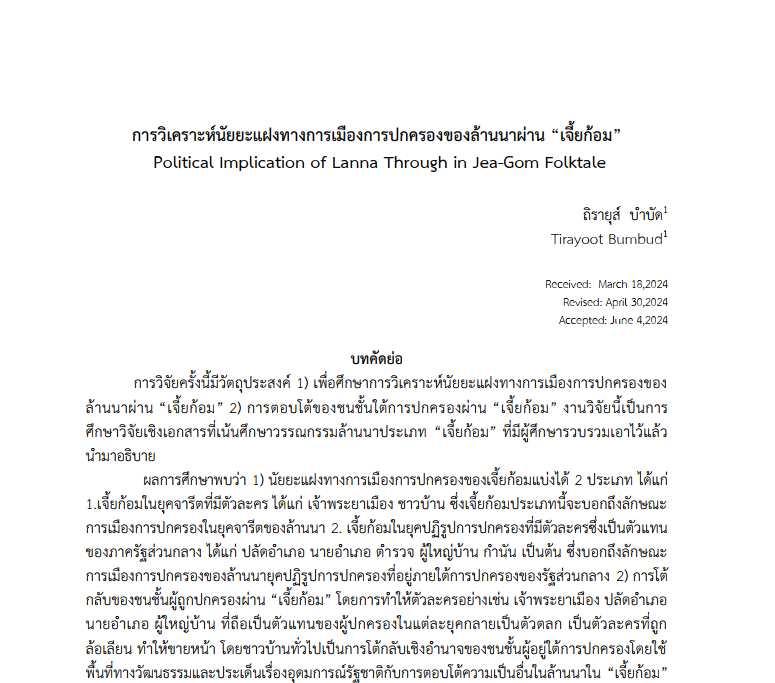Political Implication of Lanna Through in Jea-Gom Folktale
Keywords:
Political Implication, Lanna, Jea-Gom FolktaleAbstract
The research aimed to explore two main objectives. Firstly, it studied Lanna politicalaspect through ‘Jia-Gom Folktale’. The commoners’ retaliation through ‘Jia-Gom’ was also investigated. Documentary research was conducted through the existed Lanna literatures, ‘Jia-Gom Folktale’. ‘Jia-Gom Folktale’ was categorized into two categories based on political aspect; which are traditional Jia-Gom and post-revolution Jia-Gom. The traditional one was portrayed via the characters of Chaphrayamuang (the ruler) and Chaobaan (lay persons) in traditional Lanna practice. The latter period consists of the characters like Nai Amphoe (District Chief), Palad Amphoe (Assistant District Chief Officer) and Poo Yai Baan (Viaalge headman). These are the characters of the representatives of elites from the central government in each period.
The research found that these characters revealed the retaliation of the under-ruled people in Jia-Gom Folktale in two ways. First, culturally aspect, the elites in the revolution period would be treated in sarcastic way. The villagers would make fun of the behaviors of Nai Amphoe (District Chief), Palad Amphoe (Assistant District Chief Officer) and Poo Yai Baan (Viaalge headman). The second approach was the retaliation via nation state ideology. Centralization was portrayed by the language differentiation. Jia Gom has narrated the usage of central dialect by Lanna villagers and the phrase Khon Paak Klang (Central people) was mentioned. This has strongly implied the sense of differentiation between indigenous Lanna people and people from the central region and the central government. This sense of differentiation has adhered with the centralization from Siam or Lanna reformation. Thus, it is obvious that Jia-Gom has been political implication which apparently implied the retaliation and power negotiation from the villagers or the under-ruled people in Lanna through the sarcastic amusing sense in Jia-Gom. The sense of political retaliation has been obvious in each period.
References
เกรียงศักดิ์ เชษฐพัฒนวนิช. (2554). การช่วงชิงอัตลักษณ์ในสังคมจารีตเชียงใหม่ผ่านเรื่องเล่าแบบจารีต. คณะมนุษยศาสตร์ มหาวิทยาลัยเชียงใหม่.
จิรชาติ สันต๊ะยศ. (2551). การสร้าง “พระราชชายาเจ้าดารารัศมี” ให้เป็นบุคคลสำคัญในประวัติศาสตร์ ทศวรรษ 2500 – ปัจจุบัน” (วิทยานิพนธ์ศิลปศาสตรมหาบัณฑิต) สาขาประวัติศาสตร์ มหาวิทยาลัยเชียงใหม่.
วัชรินทร์ แก่นจันทร์. (2555). วาทกรรมความเป็นอื่นในวรรณกรรมล้านนา (วิทยานิพนธ์ศิลปศาสตร มหาบัณฑิต) สาขาวิชาภาษาไทย บัณฑิตวิทยาลัย มหาวิทยาลัยเชียงใหม่.
สรัสวดี อ๋องสกุล. (2551). ประวัติศาสตร์ล้านนา. กรุงเทพฯ: สำนักพิมพ์อมรินทร์.
สุรสิงห์สำรวม ฉิมพะเนาว์. (2525). โลกทัศน์ล้านนา ศึกษาจากซอเก็บนก. วารสารสังคมศาสตร์ มหาวิทยาลัยเชียงใหม่, 6(2), 11-36.
หทัยวรรณ ไชยะกุล. (2539). การสร้างมุขตลกในเรื่องขำขันล้านนา (วิทยานิพนธ์ปริญญามหาบัณฑิต) มหาวิทยาลัยเชียงใหม่.









